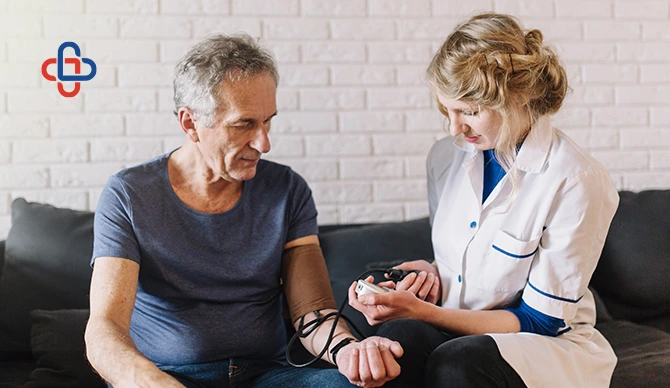Ever checked your blood pressure in the morning and noticed it’s higher than usual? You’re not imagining things. Morning blood pressure spikes are real, and for some, they can be dangerous.
At Cardiology Care NYC, we often see patients who are puzzled by these sudden changes. Blood pressure naturally fluctuates throughout the day, but those sharp morning rises are strongly linked to heart attack, stroke, and other cardiovascular events. Let’s break down why this happens, what it means for your health, and what you can do about it.
Table of contents
Blood Pressure Fluctuations: What’s Normal and What’s Not
Your blood pressure is not static, it ebbs and flows:
- Highest: Usually between 6 AM and 10 AM, right after waking.
- Lowest: During deep sleep, typically in the middle of the night.
This daily rhythm is called a circadian pattern. While normal fluctuating blood pressure is harmless, unstable or exaggerated spikes, especially in the morning, can put serious stress on your heart and arteries.
If you notice unpredictable or random blood pressure spikes, it’s worth paying attention. A simple blood pressure screening test can help confirm whether your readings are consistently high or just occasional.
Why Is Blood Pressure Higher in the Morning?
Morning hypertension isn’t random, it’s part of how your body gears up for the day. Here’s what’s happening:
- Stress hormone surge: Cortisol and adrenaline rise after waking, increasing heart rate and constricting blood vessels.
- Nervous system activation: Your fight or flight system wakes up too, preparing you for activity.
- Vessel tightening: Blood vessels naturally narrow in the morning, pushing blood pressure higher.
For people with hypertension or unstable blood pressure, this surge can trigger sudden spikes that are more than just a number, they’re a warning sign.
What Causes Blood Pressure Spikes?
Not all spikes are built-in. Some are influenced by lifestyle, health conditions, or medications:
- Lifestyle factors: caffeine, smoking, excess alcohol, poor sleep.
- Medical conditions: sleep apnea, kidney disease, thyroid imbalances.
- Medication timing: missing doses or inconsistent use of blood pressure meds.
- Stress and anxiety: particularly during busy morning routines.
To get a full picture of what’s happening, tests like a holter monitor or an electrocardiogram (ECG) may be recommended. These help track your heart’s activity and reveal whether irregular rhythms are contributing to blood pressure fluctuations.
Why Morning Blood Pressure Spikes Are Dangerous
Here’s the concerning part: most heart attacks and strokes happen in the morning.
Why? Because that natural surge collides with vulnerable arteries already stressed by hypertension or plaque buildup. An exaggerated morning blood pressure spike can:
- Raise the risk of stroke and heart attack.
- Damage blood vessels over time, leading to stiffening or rupture.
- Strain the heart, especially in young adults whose high BP is often overlooked.
In fact, research shows that ignoring morning spikes can underestimate true cardiovascular risk. A targeted evaluation such as a stress test, can reveal how your heart and blood pressure respond under physical exertion, helping uncover risks not seen in routine screenings.
Nighttime vs Morning Blood Pressure Spikes
Not all spikes happen in the morning. Sometimes, nighttime patterns are just as telling:
- Morning spikes: Linked to heart attacks, strokes, and sudden cardiac events.
- Nighttime spikes: Often tied to sleep apnea, kidney disease, or medication issues.
Symptoms of nighttime spikes may include morning headaches, fatigue, or dizziness upon waking. Both patterns deserve evaluation. Advanced imaging like an echocardiogram can help assess if prolonged spikes have caused structural changes to the heart.
How to Manage and Prevent Blood Pressure Spikes
The good news? Morning blood pressure spikes can be managed.
Lifestyle strategies:
- Cut back on salt, caffeine, and alcohol.
- Maintain regular exercise and a healthy weight.
- Prioritize quality sleep and stress reduction.
Medical strategies:
- Adjusting the timing of blood pressure medication (always under a doctor’s guidance).
- Using home monitoring or a 24-hour ambulatory blood pressure monitor (ABPM) to capture spikes.
- Scheduling routine checkups with a cardiologist for personalized care.
For patients looking for a broader view of their cardiovascular status, a heart health screening provides a comprehensive look at heart function, risk factors, and potential damage from unstable blood pressure.
At Cardiology Care NYC, we offer same-day appointments and advanced diagnostics to pinpoint what’s driving your blood pressure fluctuations.
Conclusion
Blood pressure naturally rises in the morning, but when those numbers climb too high, they can become dangerous. The key is identifying the cause early and managing it with the right strategy.
At Cardiology Care NYC, our board-certified cardiologists provide same-day evaluations, personalized treatment, and advanced monitoring to protect your heart. Whether through a cardiology consultation or specialized tests, we can help you get clarity and peace of mind.
If you’ve noticed morning spikes or fluctuating readings, don’t ignore them. Book your appointment today and take control of your cardiovascular health.
Frequently Asked Questions
Why is my blood pressure higher in the morning?
Because of natural hormone surges, vessel tightening, and nervous system activation—factors that are exaggerated if you have hypertension.
What time of day is blood pressure highest?
Typically between 6 AM and 10 AM, right after waking.
What causes sudden spikes in blood pressure?
Lifestyle triggers (caffeine, stress, smoking), underlying medical conditions, or inconsistent medication use.
Are morning blood pressure spikes dangerous?
Yes, especially for those with hypertension. They’re strongly linked to heart attack and stroke risk.
Source
- Duke Health – Spikes in Blood Pressure Among Young Adults Spell Trouble in Mid-Age
- American Heart Association – Morning Surge in Blood Pressure and Cardiovascular Risk: Evidence and Perspectives
- Durham Nephrology – Top 10 Causes for Blood Pressure Spikes
- High Tower Clinical – Is Your Blood Pressure Playing Tricks on You?
Disclaimer
This blog is for informational & educational purposes only, and does not intend to substitute any professional medical advice or consultation. For any health related concerns, please consult with your physician, or call 911.
